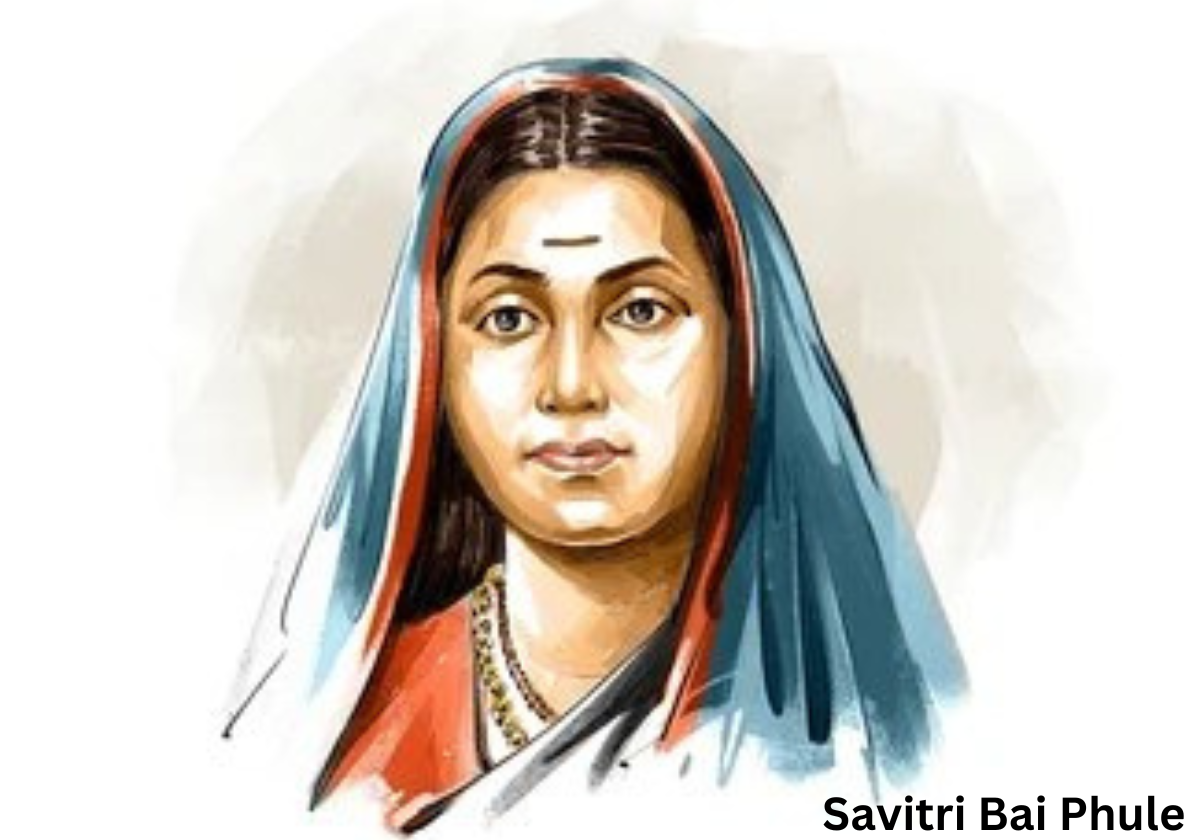In the 19th century, Savitri Bai Phule was an inspirational Indian social reformer, poet and educator. Savitribai Phule is widely seen as the first female teacher in India. Even today, she is celebrated for her efforts towards women’s education and Indian society as a whole. She was born in Naigaon, Maharashtra on January 3, 1831, and was a remarkable person who endeavoured towards the upliftment of women and other oppressed groups in society. With her educational work, campaigns for women’s rights, and caste reforms against discriminatory practices, Savitri Bai Phule is a powerful figure in the Indian feminism and social reform movements.
Savitri Bai Phule was born to Khandoji Neve and Bhivrabai, who were not highly regarded in India’s society. She came from a lower caste household that was deemed untouchable. Nevertheless, her parents held progressive views and did not concede to societal standards. Savitri Bai got married to Jyotirao Phule at the age of 9, this is considered a key event in Savitri Bai’s life. She got married to a social reformer, Jyotirao Phule, who played a vital role in shaping Savitri Bai’s vision. With social pressure imposed on women, Jyotirao Phule encouraged her to earn an education. Savitri Bai Phule accepted several challenges like the conservative traditions of the day and became one of the first formally educated women in India.
Savitri Bai Phule: Enhancing Connector’s Education
The most noteworthy contribution made by Savitri Bai Phule to society was her focus on increasing girls’ and women’s education. There was an overwhelming perception during her time that girls should not be educated, and she wanted to change that. In the year 1848, she, along with her husband, Jyotirao Phule, co-founded the first females’ school in Pune, Maharashtra. There was massive opposition from some conservative leaders who thought that this trend of girls’ education would ruin traditional systems, and there was a significant backlash for this initiative.
While confronting this stark patriarchal culture and the stigma that came alongside it, Savitri Bai Phule remained composed and focused on her mission and vision of educating women. Even with this tremendous prejudice, she started several girls’ schools in Maharashtra, especially in rural regions. By the time she reached the end of her life, she managed to find more and more female schools, ensuring that women got the education they had been deprived of their entire lives.
Savitri Bai Phule: Women with Rights
Savitri Bai Phule, together with fighting for education, attempted to improve the condition of women in India. It was noticeable to her that women were able to be subjected to physical and mental abuse were devoid of the most essential rights and were oppressed in virtually all walks of life. In her opinion, certainly one of the factors that contributed to the suffering of women was the traditionally deep-seated and submerged system, which deprived them of both control and freedom.
During her life, Savitri Bai Phule also opposed approaches like child marriage and Sati widow burning amongst others.S hee became a widow at an early age and often found support in Phule during that period which was considered socially unacceptable. At that time, Savitri Bai Phule through her contribution argued on the basis that women have the right to lead a life of respect and in circumstances devoid of oppression.
Furthermore, several of her works which include poems, and plays were very critical of the shackles that were placed on people during those times. For instance, her famous ‘Kavyaphule’ advocated for the emancipation of women, by publicly urging more of them to appeal to change. She used her poetry to encourage women to embrace education and partake in different forms of social activism for change.
Savitri Bai Phule: Combat Discrimination Based on Caste System
Phule Wife did not see caste discrimination through the glasses of manipulation and oppression that were so prevalent in Indian society then. WhenwijdiJauu says that women do feel caste discrimination in India and that distinguishes one group of society from another. There is no doubt that this caste system has been one of the major reasons for inequality and discrimination in society and what Savitri Bai Phule did was take the head-on approach against such a caste-discriminatory status quo.
She was also a part of the Satyashodhak Samaj: Society of Truth Seekers which was set up by Jyotirao Phule alongside her, which sought to advocate for justice and abolition of gender discrimination and aimed at uplifting the marginalized people. The Satyashodhak Samaj was established to rebut discrimination based on caste, untouchability and other manner of social injustices. Revolutionarily, Savitri Bai Phule opposed the idea of turning the feminist movement into one based on caste so she instead ppleasedinter caste marriages.
Savitri Bai Phule also never refrained from promoting inter-caste marriages, something that was unheard of in those times. In her opinion, the only way for people to be able to ensure that people married out of their caste and began a life together.
Savitri Bai Phule: Legacy and Recognition
Savitri Bai Phule fought day and night for women’s rights, education and social justice. Her dream of a world in which every person: man, woman or child, of any caste and or religion is given the due respect still lingers and drives countless social reformers and activists alike.
There’s no denying that Savitri Bai Phule is regarded among the earliest social reformers in india. Many institutions and organizations also attribute her as helping in the education of women. Every year, the 3rd of January, which marks her birth is observed as Savitri Bai Phule Jayanti. Other than that her name can be found in numerous educational centers, gardens and public places across the many regions of India.
Savitri Bai Phule set a high benchmark for education and the fight against societal standards that fostered disadvantages. Even to this day, her vision of having an able and equal society speaks out to people who are aiming for a better tomorrow.
Conclusion
In the history of India, Savitri Bai Phule embodies the true strength of an individual’s conviction that can carve a new order in society. The life she led in her essence as a working woman which was revolutionary – paved the way for women’s education, social justice and anti-caste discrimination. While she has over time, met with great criticism and struggled, she remains stalwart in what she wishes to achieve. She is compelling and remains a powerful part of India’s political and civil educational development. Her fight for women’s social, economic and political liberty will no doubt be remembered in brighter days of Indian History.

